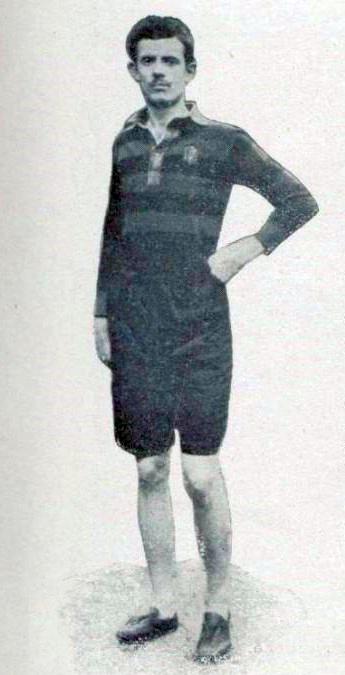1. Overview

Adolphe Klingelhoefer, born Adolphe Christiano Klingelhoeffer (May 2, 1880 - December 19, 1956), was a notable French track and field athlete and rugby union player who competed in the 1900 Summer Olympics held in Paris, France. His life and career are marked by a unique dual involvement in elite sports and a significant professional role in the financial sector, including diplomatic connections through his family. Despite being officially listed as French for his Olympic appearances, historical documents have raised questions about his nationality at the time, leading to an ongoing debate that highlights the complexities of identity and official recognition in sports history.
2. Early Life
Adolphe Klingelhoefer was born on May 2, 1880, in Paris, France, where he also spent his upbringing. His full birth name was Adolphe Christiano Klingelhoeffer. He came from a family with diplomatic ties, as his father served as a Brazilian diplomat, specifically holding the position of vice-consul at the Brazilian embassy in France. This background provided him with a unique bicultural heritage that would later become a subject of discussion regarding his national identity.
3. Athletic Career
Klingelhoefer distinguished himself as a versatile athlete, achieving significant success in both track and field and rugby union. His athletic career spanned the turn of the 20th century, a period of evolving modern sports.
3.1. Track and Field
Klingelhoefer was a prominent figure in French athletics, particularly in hurdling events, where he achieved national recognition and set records.
3.1.1. 1900 Summer Olympics
Klingelhoefer participated in three track and field events at the 1900 Summer Olympics in Paris, though he achieved limited success in his Olympic debut.
- In the 60 metres event, he competed in a heat of five athletes, finishing either fourth or fifth, which was insufficient to advance to the next round.
- For the 200 metres, he placed third in his preliminary heat, again failing to qualify for the final.
- His participation in the 110 metres hurdles was cut short when he pulled up lame during his heat, unable to finish the race and thus not qualifying for the final.
3.1.2. French National Competitions
Beyond his Olympic appearance, Klingelhoefer enjoyed considerable success in French national athletics competitions. Between 1899 and 1903, he secured a remarkable six French national titles. Four of these titles were in the 110 metres hurdles, and the remaining two were in the 400 metres hurdles. His dominance in hurdling was further cemented by setting two national records in the 110 metres hurdles, one in 1903 and another in 1904.
3.2. Rugby Union
In addition to his track and field prowess, Klingelhoefer was also an accomplished rugby player. He was affiliated with the prestigious Racing Club de France, a prominent sports club based in Paris. His rugby career reached a peak when he played a crucial role in his club's victory in the 1901-02 French Rugby Union Championship. In the championship match, Klingelhoefer was one of two players who scored a try, contributing significantly to Racing Club de France's triumph.
4. Professional Career
Beyond his athletic achievements, Adolphe Klingelhoefer pursued a distinguished professional career. He ventured into the financial sector, where he accumulated wealth and established himself. Leveraging his family's diplomatic connections and his own expertise, he rose to become a high-ranking official within the Brazilian Chamber of Commerce. This role underscored his continued connection to Brazil, despite his primary residence and athletic representation being in France.
5. Nationality Controversy
A significant point of discussion surrounding Adolphe Klingelhoefer's legacy is the controversy regarding his nationality at the time of the 1900 Summer Olympics. While official Olympic results consistently list him as French, documents released in 2009 by an Olympic historian presented evidence suggesting that Klingelhoefer was, in fact, a Brazilian national during the 1900 Games. This claim is based on historical records that contradict his listed French nationality. However, as of today, these facts have not been formally recognized by either the Brazilian Olympic Committee or the International Olympic Committee. This unresolved discrepancy continues to fuel debate among sports historians and highlights the complexities of national representation and historical record-keeping in international sporting events.
6. Death
Adolphe Klingelhoefer died on December 19, 1956, in Courbevoie, France. He was 76 years old at the time of his passing.
7. Assessment
Adolphe Klingelhoefer's life represents a fascinating intersection of athletic excellence, professional achievement, and a contested national identity. His contributions to both track and field and rugby union, coupled with his career in finance and diplomacy, paint a picture of a multi-talented individual navigating the social and sporting landscapes of his era.
7.1. Contributions and Achievements
Klingelhoefer's positive contributions to sports are evident in his impressive record. His six French national titles in hurdling, along with setting two national records, underscore his significant impact on French athletics during his time. His success was not limited to individual sports; his role as a try-scorer in Racing Club de France's 1901-02 French Rugby Union Championship victory demonstrates his versatility and team spirit. Beyond sports, his rise to a high-ranking position in the Brazilian Chamber of Commerce and his success in the financial world highlight a robust professional life, demonstrating a capacity for leadership and business acumen. These achievements collectively reflect a life of dedication and accomplishment across diverse fields.
7.2. Criticisms and Debates
The primary debate surrounding Adolphe Klingelhoefer revolves around his nationality during the 1900 Olympics. The existence of historical documents suggesting he was a Brazilian national at that time, despite official records listing him as French, raises important questions about historical accuracy and the transparency of official sporting bodies. The fact that the Brazilian Olympic Committee and the International Olympic Committee have not formally recognized these claims means that this aspect of his identity remains an unresolved historical puzzle. This ongoing debate challenges the established narrative of his athletic career and underscores the complexities inherent in verifying the national identities of athletes from over a century ago, particularly when official records conflict with later historical findings.